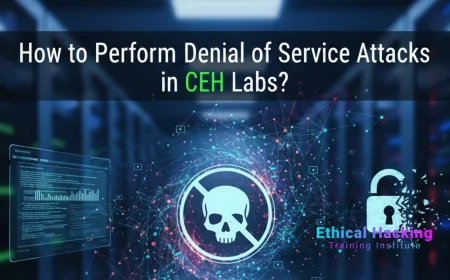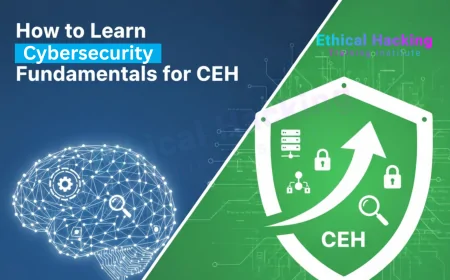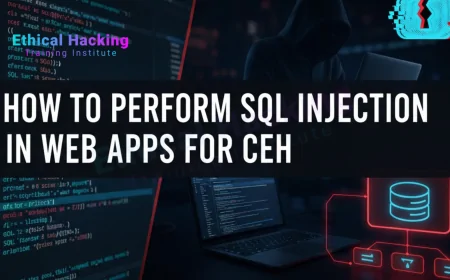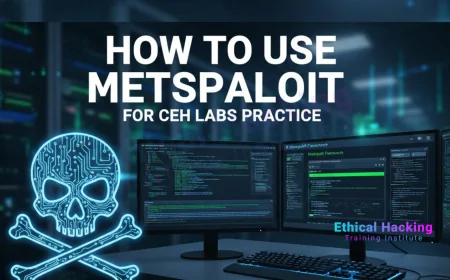EC Council Ethical Hacking Certification: Why It's One of the Best in the Industry | CEH by EC-Council: A Trusted Name in Ethical Hacking Certifications
Learn why EC Council's Certified Ethical Hacker (CEH) certification is one of the top cybersecurity credentials in the world. Explore its global recognition, hands-on labs, career benefits, and training options.
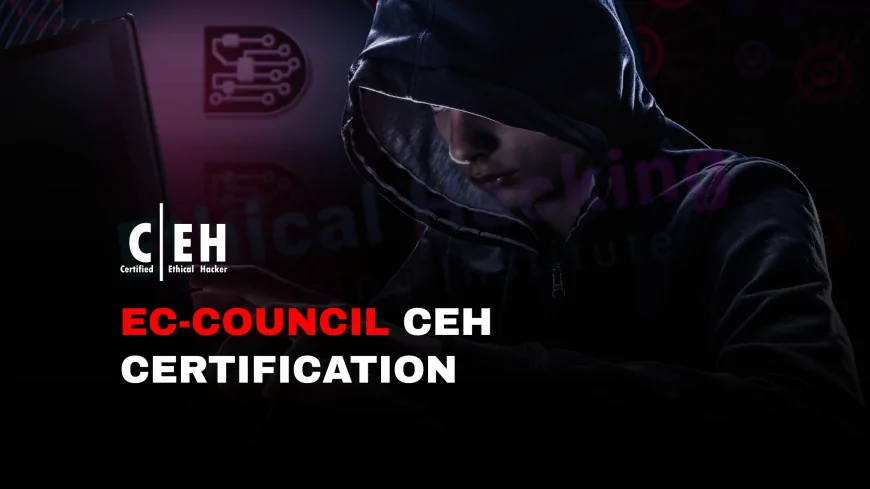
Table of Contents
- Introduction
- Certification Overview
- Global & Department of Defense Recognition
- Hands-on Labs & AI-enhanced Learning
- Curriculum Depth & Coverage
- Career Advantages & Salary Boost
- Competitive Edge in the Job Market
- Access to EC Council Resources & Networking
- Who Should Pursue CEH?
- Addressing Common Criticisms
- FAQs
- Conclusion
Introduction
Recognized worldwide, the EC-Council CEH certification delivers a comprehensive learning experience—covering tools, techniques, and vulnerabilities essential to ethical hacking. This article explores why CEH stands out, from DoD recognition to advanced AI-driven labs, and why it remains a top choice in cybersecurity.
Certification Overview
The Certified Ethical Hacker (CEH) certification, offered by the EC-Council (International Council of E-Commerce Consultants), is one of the most widely recognized and respected ethical hacking credentials in the cybersecurity industry. It validates a professional’s ability to assess the security of computer systems by identifying vulnerabilities using the same knowledge and tools as a malicious hacker—but in a lawful and legitimate manner.
Launched in 2003, CEH has evolved with the ever-changing threat landscape, making it a gold standard for individuals seeking a structured path into ethical hacking, penetration testing, and information security. It is ANSI-accredited, recognized by the U.S. Department of Defense under DoD 8140/8570, and is accepted by major global enterprises and government bodies worldwide.
Key Details:
- Certification Body: EC-Council (www.eccouncil.org)
- Latest Version: CEH v12 (includes global hacking challenges, labs, and LMS)
- Format: Multiple-choice exam (125 questions, 4-hour duration)
- Delivery: Online proctored or Pearson VUE testing centers
- Eligibility: Training from EC-Council ATC or 2 years of infosec experience (with eligibility application)
- Cost: Varies by country and training provider; typically between $950 – $1,200 (USD)
What You Learn:
The CEH curriculum covers 20 in-depth modules including:
- Footprinting and reconnaissance
- Scanning networks and vulnerability analysis
- System hacking and malware threats
- Social engineering and session hijacking
- Cloud, IoT, and mobile platform security
- Web application hacking and SQL injection
- Cryptography, evasion techniques, and IDS bypass
With access to CyberQ labs, learners can simulate attacks in realistic environments. Additionally, CEH now includes global hacking challenges and optional CEH Practical exam to prove hands-on competency.
Whether you’re entering the cybersecurity field or advancing your skills, CEH offers the credibility, structured training, and industry recognition to support a strong ethical hacking career.
Global & Department of Defense Recognition
- ANSI-accredited certification that meets U.S. DoD Directive 8140 (8570) compliance.
- Adopted by Fortune 500 companies and recognized by governments worldwide.
- Mapped to 49 cybersecurity job roles globally.
Hands‑On Labs & AI‑Enhanced Learning
EC‑Council’s CEH includes rich lab experiences:
- 221 labs and 551 attack techniques using real-world environments.
- Access to over 4,000 hacking tools through CyberQ™ labs.
- AI-powered training enhances lab efficiency and real-world simulation, improving learning outcomes by 40%.
Curriculum Depth & Coverage
The Certified Ethical Hacker (CEH) curriculum offered by the EC-Council is known for its comprehensive and structured approach to ethical hacking. With over 20 well-defined modules, the CEH program is meticulously designed to cover the entire ethical hacking lifecycle, including reconnaissance, enumeration, exploitation, and post-exploitation tactics.
Each module is curated to ensure learners understand not only the tools and techniques but also the strategic mindset of a hacker. The content is regularly updated to reflect the current threat landscape, emerging vulnerabilities, and defense strategies.
Core Modules Include:
- 1. Introduction to Ethical Hacking: Concepts, legality, scope, and methodologies
- 2. Footprinting and Reconnaissance: Passive and active intelligence gathering
- 3. Scanning Networks: Identifying live systems, open ports, and services
- 4. Enumeration: Gaining system details using NetBIOS, SNMP, and LDAP
- 5. Vulnerability Analysis: Automated and manual vulnerability discovery
- 6. System Hacking: Techniques including password cracking, privilege escalation, and rootkits
- 7. Malware Threats: Trojans, worms, backdoors, and antivirus evasion
- 8. Sniffing: Packet capturing, ARP poisoning, and defense mechanisms
- 9. Social Engineering: Phishing, impersonation, and human-centric attacks
- 10. Denial-of-Service (DoS): Flooding attacks and mitigation techniques
- 11. Session Hijacking: TCP, IP spoofing, and securing sessions
- 12. Evading IDS, Firewalls & Honeypots: Obfuscation and stealth techniques
- 13. Hacking Web Servers: IIS and Apache exploitation
- 14. Hacking Web Applications: OWASP Top 10, XSS, SQLi, CSRF
- 15. SQL Injection: Exploiting databases and preventing injection flaws
- 16. Hacking Wireless Networks: WPA/WPA2 attacks, rogue APs, and sniffing
- 17. Hacking Mobile Platforms: Android and iOS exploitation methods
- 18. IoT and OT Hacking: Attacking smart devices, embedded systems
- 19. Cloud Computing Threats: AWS, Azure, container security
- 20. Cryptography: Encryption methods, SSL attacks, key management
Tools & Technologies Covered:
Learners work with over 4,000 real-world tools such as Nmap, Metasploit, Burp Suite, Wireshark, John the Ripper, Nikto, SQLmap, and more—inside EC-Council’s CyberQ virtual labs. The labs simulate real attack environments, enabling students to gain hands-on penetration testing experience.
Emerging Technologies & Topics:
- AI-Powered Attacks and Defenses
- Cloud & Kubernetes Security
- Operational Technology (OT) Pen Testing
- Advanced Persistent Threat (APT) modeling
Whether you're a network administrator, penetration tester, or aspiring security analyst, the CEH curriculum provides the **technical foundation and depth** required to defend systems against evolving cyber threats and to think like a real-world hacker.
Career Advantages & Salary Boost
- CEH-certified professionals earn up to 20% more on average.
- About half of CEHs report getting promotions after certification.
- CEH skills help safeguard organizations against threats; 97% of certified professionals agree.
Competitive Edge in the Job Market
The EC-Council Certified Ethical Hacker (CEH) certification provides professionals with a distinct advantage in today’s highly competitive cybersecurity job market. As cyber threats grow in complexity, organizations increasingly seek certified professionals who can proactively defend systems and infrastructure. CEH is widely recognized as a baseline certification for hiring ethical hackers, penetration testers, and SOC analysts.
Why CEH Stands Out:
- HR Filter Recognition: CEH is often listed as a required or preferred credential in cybersecurity job postings worldwide.
- Mapped to Job Roles: The CEH is aligned with 49 cybersecurity job roles under frameworks like NICE (U.S. National Initiative for Cybersecurity Education).
- Approved by U.S. DoD: Recognized under DoD 8140/8570, qualifying CEH holders for government and military IT security roles.
- Global Enterprise Adoption: Leading companies like IBM, Deloitte, Accenture, EY, and Cisco recognize CEH as a trusted standard.
Salary & Promotion Benefits:
- CEH-certified professionals report earning 20% higher average salaries than their non-certified peers.
- According to EC-Council, 96% of CEH holders felt it positively impacted their job prospects.
- Professionals often secure roles like Security Analyst, SOC Specialist, Vulnerability Analyst, and Junior Penetration Tester within months of certification.
In-Demand Roles for CEH Holders:
- Ethical Hacker / Penetration Tester
- Security Operations Center (SOC) Analyst
- Cybersecurity Analyst
- Network Security Engineer
- Threat Intelligence Analyst
- IT Security Administrator
Worldwide Demand:
With an estimated 3.5 million unfilled cybersecurity jobs globally and rising cyberattacks on both public and private sectors, organizations are actively seeking CEH-certified professionals. The CEH credential signals to employers that a candidate has the foundational knowledge, hands-on skill, and ethical mindset to defend against modern threats.
CEH vs Other Certifications:
While certifications like CompTIA Security+ are more entry-level and OSCP is more advanced and hands-on, CEH strikes the perfect balance of:
- Theoretical understanding of attack vectors and tools
- Hands-on labs through EC-Council’s CyberQ and live simulations
- Global recognition across industries and government entities
Whether you’re aiming for your first cybersecurity role or looking to pivot into ethical hacking, the CEH gives you the competitive credibility to stand out on resumes, job boards, and in interviews.
Access to EC Council Resources & Networking
- Exclusive access to webinars, communities, and EC-Council events.
- Global exposure via conferences like Hacker Halted and CISO forums.
- Join thousands of certified professionals worldwide for collaboration and mentorship.
Who Should Pursue CEH?
CEH suits a wide range of professionals:
- Security analysts, engineers, pentesters, and consultants.
- Managers (e.g., CISOs) seeking technical insight into hacker tactics.
- IT and networking professionals transitioning into cybersecurity.
- Career changers and students looking for a globally recognized certification.
Addressing Common Criticisms
Some professionals criticize CEH for its theoretical focus and exam-style. However:
- EC‑Council has responded by adding AI-enhanced labs and practical assessments.
- Effective preparation includes using CEH labs plus external platforms like TryHackMe and CTFs.
- CEH is meant as a foundational cert; deeper practical certs like OSCP are available afterward.
FAQs
1. What makes CEH globally recognized?
CEH is ANSI-accredited and part of DoD Directive 8140 compliance.
2. What type of exam is it?
125 multiple-choice questions, 4 hours duration.
3. Does CEH include hands-on labs?
Yes—221 real-world labs and over 4,000 tools via EC‑Council’s CyberQ™ labs.
4. Is AI integrated into CEH training?
Yes—it includes AI-powered learning tools that improve lab efficiency.
5. Who recognizes CEH?
Fortune 500 firms, government agencies, DoD, and global cybersecurity organizations.
6. Is CEH suitable for beginners?
Yes—students, IT pros, and managers can pursue it with foundational IT knowledge.
7. Does CEH improve job prospects?
Yes—CEH helps candidates pass screening and boosts hiring preference by 92%.
8. How soon after certification can I land a job?
Many candidates report job placement or promotion within six months, aided by community support.
9. Is CEH costly?
The exam and training range from $1,000–$1,500 USD depending on vendors and formats.
10. Can CEH be taken remotely?
Yes—available via Pearson VUE and remote proctoring.
11. What’s the validity period?
Certificate is valid for 3 years, with 120 ECE credits required for renewal.
12. Does CEH include cloud & IoT?
Yes—modules cover cloud, IoT, OT, and wireless security.
13. How does CEH compare to OSCP?
CEH is tool and concept focused; OSCP is more technical and hands-on.
14. Can CEH lead to a pentesting role?
Yes—not necessarily for advanced pen-testing, but CEH helps in SOC and entry-level penetration roles.
15. Are CEH labs enough?
Excellent for foundational skills—but supplement with TryHackMe, HTB, and bug bounties.
16. Are CEH skills used daily?
Yes—security analysts and network defenders use these skills routinely.
17. What about practical CEH?
CEH Practical is a performance-based version that validates real-world abilities.
18. How often is the syllabus updated?
CEH refreshed regularly; the latest version includes AI-driven techniques.
19. Does CEH guarantee a job?
No single cert guarantees employment—but CEH significantly improves chances, especially combined with labs and networking.
20. What’s the next step after CEH?
Follow up with OSCP, GPEN, or other advanced certs, specializing in deep technical roles.
Conclusion
The EC‑Council CEH combines global recognition, impactful hands-on labs, and updated, AI-integrated curriculum to remain one of the best ethical hacking certifications available. Ideal for a wide range of professionals, it offers both foundational knowledge and career leverage. Whether you're launching a cybersecurity career or climbing the ladder, CEH can position you for success—especially when supplemented with real-world practice and ongoing learning.
What's Your Reaction?
 Like
0
Like
0
 Dislike
0
Dislike
0
 Love
0
Love
0
 Funny
0
Funny
0
 Angry
0
Angry
0
 Sad
0
Sad
0
 Wow
0
Wow
0






